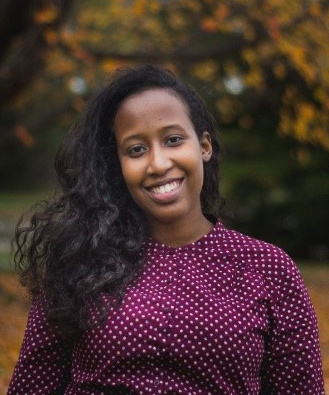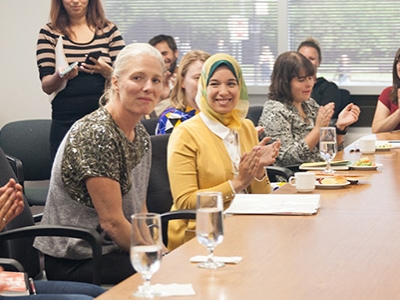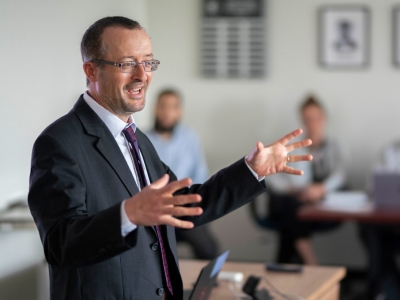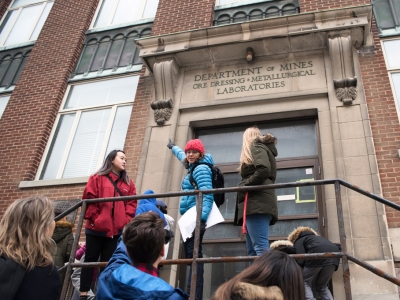By Joseph Mathieu
On top of their technical knowledge, hard work and creativity, Ragini Bakshi and Hodhan Osman feel like friendship will give them an edge at this year’s Canadian Engineering Competition (CEC).
“It really helps if you are friends in team competitions like these,” says Osman, a fourth-year student in architectural conservation and sustainability engineering. “We know each other so well that we recognize our weaknesses and our strengths. We can split the work better. We know what the other is thinking.”
From Feb. 26 to 28, the pair are representing Carleton University at the national competition for undergraduate engineering students in one of eight categories. They qualified by winning second place in the Re-Engineering category at the 42nd annual Ontario Engineering Competition (OEC) on Jan. 24.

Fourth-year Electrical Engineering student Ragini Bakshi.
“We are very excited,” says Bakshi, a fourth-year student in electrical engineering. “Man, I love these competitions! I’m going to miss this, after we graduate.”
Their excitement isn’t even lessened by the 37th annual CEC being held entirely online. The University of New Brunswick and the Canadian Federation of Engineering Students (CFES) are using Slack and Zoom to host about 200 students from engineering schools across the country.
If anything, it makes it simpler for Bakshi and Osman to focus on beating seven other teams in their category. The challenge they must face is the realistic redesign of an existing product or process to improve its functionality, or to adapt it for a completely new purpose.
This year’s Re-Engineering case studies focus on adapting a school to all kinds of accessibility needs, which they’ve worked on for the week before the CEC weekend, and on something related to aquaculture, which will be revealed on Saturday morning.
In teams of two, the competitors analyze case studies from all angles, find solutions in existing technology or processes and create an easy-to-understand presentation. Their proposed solutions are judged on their functionality and achievability, their real-world application and their marketability.

Fourth year Architectural Conservation and Sustainability Engineering student, Hodhan Osman.
“It has to be feasible,” says Osman. “Basically, we just look at available technology and think of how to make it help society immediately.”
Osman and Bakshi became fast friends in their first terms. They met in 2016 in the Architecture Building, where Bakshi was taking an industrial design elective and Osman was beginning her structural engineering degree. In 2019, they competed at OEC in a team of four in the Consulting category. They were disappointed to place third — a spot shy of making nationals. And so, the thrill of finally making it to the CEC is heightened by the fact they are in their final undergraduate terms.
Bakshi and Osman went to the 2021 regional qualifiers because they placed first at the Carleton Engineering Competition (C-Eng-C) on Oct. 4, 2020. They redesigned a common facemask to be made with sustainable fabrics and to accommodate a diversity of users, including people who read lips, people who wear headscarves and people with extremely sensitive skin.
On Jan. 24, they won second place at OEC for their concept of a hospital overflow facility during a pandemic and for their improvements of Greater Sudbury’s forest fire alarm system. The former broke down a $3.5 million budget that adapted Ottawa’s St. Laurent Shopping Centre spaces, structures and HVAC system to receive COVID-19 patients.
“I really like creating functional things,” says Osman, who chose her program for its emphasis on sustainable architecture and sensible building design.
Before joining Carleton’s Faculty of Engineering and Design in 2016, Bakshi was a biomedical research assistant at McGill University where she studied anatomy, cell biology and neuroscience.
“I’m a very creative person and I wanted to express that in my profession,” she says. “I realized that engineering in general is a creative process. There’s so much room for imagination, especially if you work in design.”
Bakshi says competitions are the “epitome of engineering”: you face a problem, you design something that addresses the problem, and you communicate your solution. There’s something wonderful in that simplicity, where constraints force them to make their own opportunities.
“At OEC, we got feedback saying we were unique in our solutions, we thought outside the box and we considered things other teams did not,” says Osman, to which Bakshi adds: “And I think if we win it’ll because we thought to do something that nobody else did.”
Friday, February 26, 2021 in Architectural Conservation and Sustainability, Competitions and Awards (External), Electrical, Experiential Learning, Interdisciplinary, Undergraduate, Women in Engineering
Share: Twitter, Facebook



